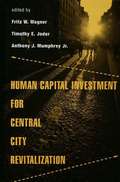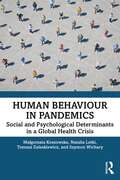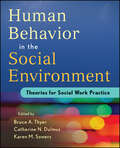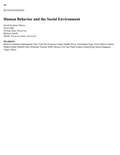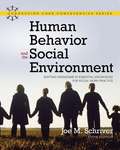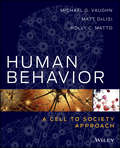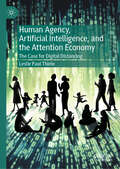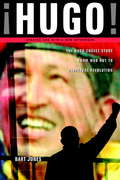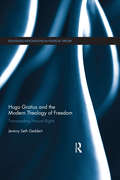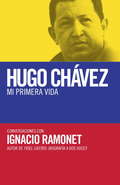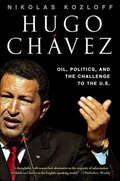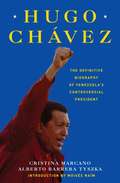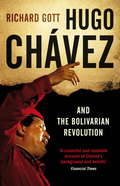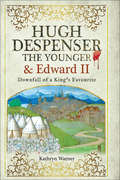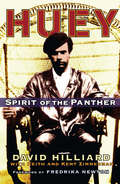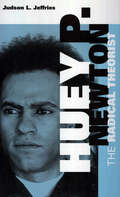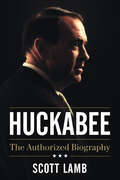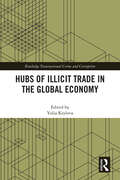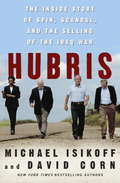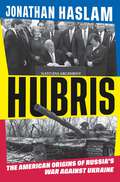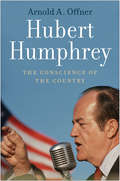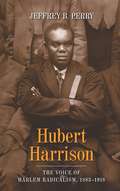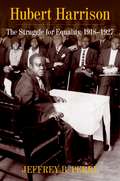- Table View
- List View
Human Capital Investment for Central City Revitalization (Contemporary Urban Affairs)
by Fritz W. Wagner Timothy E. Joder Anthony J. Mumphrey Jr.Viewing poverty as a condition that is fed and renewed on a daily basis by social and economic structures, this book focuses on the ways in which poor residents can be helped to improve their own situations, their living conditions, and the central city itself. Also includes four maps.
Human Beings in International Relations
by Jacobi, Daniel and Freyberg-Inan, Annette Daniel Jacobi Annette Freyberg-InanSince the 1980s, the discipline of International Relations has seen a series of disputes over its foundations. However, there has been one core concept that, although addressed in various guises, had never been explicitly and systematically engaged with in these debates: the human. This volume is the first to address comprehensively the topic of the human in world politics. It comprises cutting-edge accounts by leading scholars of how the human is (or is not) theorized across the entire range of IR theories, old and new. The authors provide a solid foundation for future debates about how, why, and to which ends the human has been or must (not) be built into our theories, and systematically lay out the implications of such moves for how we come to see world politics and humanity's role within it.
Human Behaviour in Pandemics: Social and Psychological Determinants in a Global Health Crisis
by Malgorzata Kossowska Tomasz Zaleskiewicz Natalia Letki Szymon WicharyThis timely interdisciplinary book brings together a wide spectrum of theoretical concepts and their empirical applications in relation to the COVID-19 pandemic, informing our understanding of the social and psychological bases of a global crisis. Written by an author team of psychologists and sociologists, the volume provides comprehensive coverage of phenomena such as fear, risk, judgement and decision making, threat and uncertainty, group identity and cohesion, social and institutional trust, and communication in the context of an international health emergency.The topics have been grouped into four main chapters, focusing on the individual, group, social, and communication perspectives of the issues affecting or being affected by the pandemic, based on over 740 classic and current references of peer-reviewed research and contextualized with an epidemiological perspective discussed in the introduction. The volume finishes with two special sections, with a chapter on cultural specificity of the social impact of pandemics, focusing specifically on both Islam and Hinduism, and a chapter on the cross-national differences in policy responses to the current health crisis. Providing not just a reference for academic research, but also short-term and long-term policy solutions based on successful strategies to combat adverse social, cognitive, and emotional consequences, this is the ideal resource for academics and policymakers interested in social and psychological determinants of individual reactions to pandemics, as well as in fields such as economics, management, politics, and medical care.
Human Behavior in the Social Environment
by Bruce A. Thyer Karen M. Sowers Catherine N. DulmusAn accessible and engaging guide to the study of human behavior in the social environment, covering every major theoretical approachProviding an overview of the major human behavioral theories used to guide social work practice with individuals, families, small groups, and organizations, Human Behavior in the Social Environment examines a different theoretical approach in each chapter-from its historical and conceptual origins to its relevance to social work and clinical applications.Each chapter draws on a theoretical approach to foster understanding of normative individual human development and the etiology of dysfunctional behavior, as well as to provide guidance in the application of social work intervention.Edited by a team of scholars, Human Behavior in the Social Environment addresses the Council on Social Work Education's required competencies for accreditation (EPAS) and explores:Respondent Learning theoryOperant Learning theoryCognitive-Behavioral theoryAttachment theoryPsychosocial theoryPerson-Centered theoryGenetic theoryEcosystems theorySmall Group theoryFamily Systems theoryOrganizational theory
Human Behavior and the Social Environment: Social Systems Theory
by Rebecca Smith Orren DaleHuman Behavior and the Social Environment: Social Systems Theory provides an expanded treatment of systems theory, and applies the theory to common social work concerns. The text links systems to social roles, and provides a framework for critical assessment of the theories from the systems/roles perspective. It assesses the strengths and weaknesses of each theory with regard to the value of each theory for social work practice. <P><P> Social systems theory remains the focus of this text. In addition theories are identified as grand theories, middle range theories, or focal theories, to assist the student in understanding the scope and application of theories across system sizes. This text breaks new ground in using role theory as a middle range theory to address common features of human systems at a level that is more intuitive for students, and yet detailed enough to stimulate independent thinking. The text addresses the standard repertoire of theories, and in addition presents application of the theories to social issues such as violence and addiction.
Human Behavior and the Social Environment: Shifting Paradigms in Essential Knowledge for Social Work Practice (5th edition)
by Joe M. SchriverThis textbook offers a comparative examination of competing paradigms in the study of human behavior and the social environment. The text focuses at each system level on the need for multiple perspectives that respect the diversity of persons and environments with whom social workers interact.
Human Behavior
by Michael G. Vaughn Holly C. Matto Matt DelisiA unique approach to human behavior that integrates and interprets the latest research from cell to societyIncorporating principles and findings from molecular biology, neuroscience, and psychological and sociocultural sciences, Human Behavior employs a decidedly integrative biosocial, multiple-levels-of-influence approach. This approach allows students to appreciate the transactional forces shaping life course opportunities and challenges among diverse populations in the United States and around the world.Human Behavior includes case studies, Spotlight topics, and Expert's Corner features that augment the theme of each chapter. This book is rooted in the principles of empirical science and the evidence-based paradigm, with coverage of:Genes and behaviorStress and adaptationExecutive functionsTemperamentPersonality and the social work professionSocial exchange and cooperationSocial networks and psychosocial relationsTechnologyThe physical environmentInstitutionsBelief systems and ideologyUnique in its orientation, Human Behavior proposes a new integrative perspective representing a leap forward in the advancement of human behavior for the helping professions."This book is like no other HBSE textbook that I have used in my teaching career. Traditional HBSE content is included within the chapters, and the authors do an excellent job of explaining complex perspectives on human development from the genome to the brain to temperament and risks in the environment. The book challenges faculty and students to look at 21st-century HBSE."-Carmen Ortiz Hendricks, DSW, ACSW, Dorothy and David I. Schachne Dean, Wurzweiler School of Social Work, Yeshiva University"This book represents a changing of the guard and a new era of thinking. Vaughn, DeLisi, and Matto have essentially replaced the so-called classic texts with their comprehensive and integrative review of the most current and relevant theory and research that is essential in understanding the complexities of human behavior. Educators will be hard pressed to find another text that will engage, challenge, and excite students in the way this book does."-Brian Perron, PhD, Associate Professor, School of Social Work, University of Michigan
Human Agency, Artificial Intelligence, and the Attention Economy: The Case for Digital Distancing
by Leslie Paul ThielePeople relish novelty, enjoy convenience, and are prone to distraction. These natural tendencies are now being dangerously exploited in the digital world. So we find ourselves bewitched by the shimmering screens of our digital devices, like moths circling a flame. It may only be a matter of time before our downward spiral reaches a deadly nadir. Leslie Paul Thiele incisively explores the psychological, social, and political impacts of social media, artificial intelligence, and digital platforms that are designed to capture our attention and maximize engagement. Digital technologies offer countless benefits. But in the attention economy, they also heighten distraction and dependence, erode cognitive and social skills, proliferate misinformation, amplify political polarization, increase social isolation, and leave us despondent. Governmental regulation is needed, but it cannot replace the individual’s responsibility to exercise self-governance. Thoroughly grounded in the latest scientific research but accessible to the general reader, this book explains how we can cultivate the dispositions, habits, and skills needed to sustain human agency and strengthen democratic prospects. In an age of incessant technological upgrading, Thiele demonstrates a vital and practical means to avert human downgrading.
Hugo! The Hugo Chàvez Story from Mud Hut to Perpetual Revolution
by Bart JonesRuling elites in Venezuela, the United States and Europe, and even Hugo Chávez himself though for different reasons, have been eager to have the world view him as the heir to Fidel Castro. But the truth about this increasingly influential world leader is more complex, and more interesting.. The Chávez that emerges from Bart Jones' carefully researched and documented biography is neither a plaster saint nor a revolutionary tyrant. He has an undeniably autocratic streak, and yet has been freely and fairly re-elected to his nations presidency three times with astonishing margins of victory. He is a master politician and an inspired improviser, a Bolivarian nationalist and an unashamed socialist. His policies have brought him into conflict with the International Monetary Fund, the World Bank, and major oil companies. They have also provided a model for new governments and social movements in Ecuador, Bolivia, and Argentina. When in September 2006 he declared at the United Nations that 'the devil came here yesterday ... the President of the United States', it was clear that he was taking on challenging the most powerful nation on earth, in conscious imitation of the Liberator, Simon Bolivar.From the Trade Paperback edition.
Hugo Grotius and the Modern Theology of Freedom: Transcending Natural Rights (Routledge Innovations in Political Theory)
by Jeremy Seth GeddertHuman rights are thought to guarantee pluralism by protecting individual liberty from imposed religious conceptions of virtue. Yet critics often argue that this secular focus on merely avoiding violations can also enable unfettered individualism and undermine appeals to the common good. This book uncovers in secular rights pioneer Hugo Grotius a rights theory that points toward the enlargement of individual responsibility. It grounds this connection in Grotius’ unexplored theological corpus, which reveals a dual metaethics and jurisprudence. Here a deontological natural law undergirds a secular theory of rights that is self-aware of its own limitations. A teleological practical reason then guides the exercise of these rights, so as not to compromise the political order that defends them. The book then illustrates this symbiosis of rights and responsibilities in five areas: consent theories of government, rights of rebellion, criminal punishment, war and international responsibility, and Atonement theology. This reassesses Grotius’ legacy as a secularist opponent of classical political thought, and suggests that modern liberalism and universal human rights are compatible with a world of resurgent religion.
Hugo Chávez: mi primera vida
by Ignacio RamonetPocos personajes de la historia reciente han tenido el impacto de Hugo Rafael Chávez Frías (1954-2013). Presidente de Venezuela desde 1999 hasta 2013, su mensaje de las realizaciones de la Revolución Bolivariana inició un movimiento en América Latina que abrió el camino para dirigentes nuevos, de origen sindical, militante social, militar o hasta guerrillero: Luiz Inácio Lula da Silva y Dilma Rousseff en Brasil, Evo Morales en Bolivia, Rafael Correa en Ecuador, Néstor Kirchner y Cristina Fernández en Argentina, Tabaré Vázquez y José "Pepe" Mujica en Uruguay, y tantos otros. En este revelador libro, fruto de cinco años de trabajo y más de doscientas horas de conversaciones con Chávez, Ignacio Ramonet logra retratar al dirigente venezolano a través de sus propias palabras. ¿Quién era Chávez antes de convertirse en una personalidad pública universalmente conocida? ¿Cómo fue su infancia? ¿Cómo se formó? ¿Cuándo se inició en la política? ¿Cuáles fueron sus lecturas? ¿Qué influencias recibió? ¿Cuál era su visión geopolítica? ¿Qué corriente ideológica reclamaba? Estas memorias dialogadas, centradas en la primera etapa de la vida del presidente venezolano, clave y explicación de su posterior trayectoria, son una obra de historia insoslayable para quien quiera entender el arranque del siglo-- en América Latina y el mundo.
Hugo Chávez: Oil, Politics, and the Challenge to the U.S.
by Nikolas KozloffAudacious, provocative, and bombastic, few world politicians are as colorful as Hugo Chávez, now making international news for his plans to nationalize U.S. owned businesses and his bold opposition to Washington's economic and trade policies. As Venezuela gains importance as the fifth largest oil exporter in the world, this firebrand leader is quickly moving to the public spotlight by uniting much of South America against the Bush administration and wielding oil as a "geopolitical weapon." To create this rich and objective portrait, Nikolas Kozloff--one of the few American journalists who has spent years in the Andean region--has profiled Chávez's top advisors, leaders of his movement, and other key figures in both Venezuela and the U.S. The result is a timely, exhaustive analysis of Chávez as a political leader, and a nuanced examination of the president moving to the center of the global stage. Includes a new afterword by the author, with insights into Chávez's reelection in relation to wider hemispheric politics.
Hugo Chávez
by Cristina Marcano Alberto Barrera TyszkaHe is one of the most controversial and important world leaders currently in power. In this international bestseller, at last available in English, Hugo Chávez is captured in a critically acclaimed biography, a riveting account of the Venezuelan president who continues to influence, fascinate, and antagonize America. Born in a small town on the Venezuelan plains, Chávez found his interests radically altered when he entered the military academy in Caracas...
Hugo Chavez and the Bolivarian Revolution
by Richard GottThe authoritative first-hand account of contemporary Venezuela, Hugo Chávez places the country's controversial and charismatic president in historical perspective, and examines his plans and programs. Welcomed in 1999 by the inhabitants of the teeming shanty towns of Caracas as their potential savior, and greeted by Washington with considerable alarm, this former golpista-turned-democrat took up the aims and ambitions of Venezuela's liberator, simón Bolivar. Now in office for over a decade, President Chávez has undertaken the most wide-ranging transformation of oil-rich Venezuela for half a century, and dramatically affected the political debate throughout Latin America. In this updated edition, Richard Gott reflects on the achievements of the Bolivarian revolution, and the challenges that lie ahead.
Hugh Despenser the Younger and Edward II: Downfall of a King's Favourite
by Kathryn WarnerHugh Despenser the Younger and Edward II tells the story of the greatest villain of the fourteenth century, his dazzling rise as favorite to the king and his disastrous fall.Born in the late 1280s, Hugh married King Edward I of Englands eldest granddaughter when he was a teenager. Ambitious and greedy to an astonishing degree, Hugh chose a startling route to power: he seduced his wifes uncle, the young King Edward II, and became the richest and most powerful man in the country in the 1320s. For years he dominated the English government and foreign policy, and took whatever lands he felt like by both quasi-legal and illegal methods, with the kings connivance. His actions were to bring both himself and Edward II down, and Hugh was directly responsible for the first forced abdication of a king in English history; he had made the horrible mistake of alienating and insulting Edwards queen Isabella of France, who loathed him, and who had him slowly and grotesquely executed in her presence in November 1326.
Huey: Spirit of the Panther
by Kent Zimmerman David Hilliard Keith Foreword by Fredrika NewtonHuey P. Newton remains one of the most misunderstood political figures of the twentieth century. As cofounder and leader of the Black Panther Party for more than twenty years, Newton (1942-1989) was at the forefront of the radical political activism of the 1960s and '70s. Raised in poverty in Oakland, California, and named for corrupt Louisiana governor Huey P. Long, Newton embodied both the passions and the contradictions of the civil rights movement he sought to advance. In this first authorized biography, Newton's former chief of staff David Hilliard and best-selling authors Keith and Kent Zimmerman team up to tell the WHOLE story of the man behind the organization that FBI director J. Edgar Hoover infamously dubbed "the greatest threat to the internal security of the country. "
Huey P. Newton: The Radical Theorist
by Judson L. JeffriesHuey P. Newton's powerful legacy to the Black Panther movement and the civil rights struggle has long been obscured. Conservatives harp on Newton's drug use and on the circumstances of his death in a crack-related shooting. Liberals romanticize his black revolutionary rhetoric and idealize his message. In Huey P. Newton: The Radical Theorist, Judson L. Jeffries considers the entire arc of Newton's political role and influence on civil rights history and African American thought. Jeffries argues that, contrary to popular belief, Newton was one of the most important political thinkers in the struggle for civil rights. Huey P. Newton's political career spanned two decades. Like many freedom fighters, he was a complex figure. His international reputation was forged as much from his passionate defense of black liberation as from his highly publicized confrontations with police. His courage to address police brutality won him admirers in ghettos, on college campuses, and in select Hollywood circles. Newton gave Black Power a compelling urgency and played a pivotal role in the politics of black America during the 1960s and 1970s. Few would deny that Newton's life (1942-1989) was strewn with incidences of violence and that his police record was long. But Newton's struggles with police took place in a rich and troubled context that included urban unrest, police brutality, government repression, and an intense debate over civil rights tactics. Stripped of history and interpretation, the violence of Newton's life brought emphatic indictments of him. Newton's death attracted widespread media attention. However, pundits offered little on Newton as freedom fighter or as theoretician and activist. Huey P. Newton: The Radical Theorist dispels myths about Newton's life, but the book is primarily an in-depth examination of Newton's ideas. By exploring this charismatic leader, Jeffries's book makes a valuable contribution to the scant literature on Newton, while also exposing the core tenets and evolving philosophies of the Black Panther Party.
Huckabee: The Authorized Biography
by Scott Lamb“How does a man go from . . . pastoring churches . . . to running for President? [This] authorized biography tells this story in all its fascinating detail.” —The PathwayFor the first time, the former governor of Arkansas opens up the vault to friend and biographer Scott Lamb to tell his life story. In this thoroughly unique biography of one of the most likeable, influential leaders in America, Lamb covers the entire scope of Mike Huckabee’s life and career. With full, unfettered access to Governor Huckabee’s personal library, files, and family records, fans will finally get the definitive account of one humble man’s rise to political prominence.The son of a local fireman in Hope, Arkansas, Huckabee began his time in the limelight at the side of James Robison during the early years of his television ministry. He hit his ministerial stride in the early 1980s, when he took the helm of Immanuel Baptist Church in Pine Bluff, Arkansas, from 1980 to 1986.Most people, however, know Mike Huckabee as a politician. In 1994, he became lieutenant governor and faced the now infamous Whitewater scandal that sent then-governor Jim Guy Tucker into court to face felony charges of corruption and fraud. Huckabee’s courageous handling of the debacle endeared him to the hearts of many citizens, causing him to serve as the forty-fourth governor of Arkansas from 1996 until 2007. During his 2008 presidential bid, he finished second to John McCain. As the host of the talk show Huckabee, he garnered even more fans, who will now have the opportunity to get to know the man behind the famous, reassuring smile.
Hubs of Illicit Trade in the Global Economy (Routledge Transnational Crime and Corruption)
by Yulia KrylovaThis book meticulously examines how centers of illicit trade pose myriad threats to global security and sustainable development. The exponential growth of illicit trade, resulting in annual losses amounting to trillions of dollars for the global economy, is increasingly concentrated within specific geographic areas. These locales serve as safe havens for smugglers and their accomplices, fostering a criminal ecosystem that facilitates the convergence of various criminal activities. The book underscores the detrimental impact of poorly regulated international free trade zones, which prioritize expediency over security, thereby allowing illicit trade to flourish in regions characterized by opaque governance and lax regulatory oversight. It comprehensively explores the spectrum of illicit trade present in notorious hubs such as the Argentina-Brazil-Paraguay Tri-Border Area, Dubai, Panama, Belize, Guatemala, and Ukraine. Emphasizing the phenomenon of crime convergence associated with these hubs, the book offers actionable recommendations for disrupting their interconnected illicit supply chains, infrastructures, and networks. By addressing this interconnectedness, the book fills a critical void in understanding how vulnerabilities within the global economy fuel the creation of illicit trade hubs. It will be of great value to researchers in the fields of trade, economics, criminology, and international development. It will also be an excellent resource for government agencies, policymakers, and private-sector managers in those industries most affected by the growing problem of illicit trade.
Hubris: The Inside Story of Spin, Scandal, and the Selling of the Iraq War
by David Corn Michael IsikoffMarch 2003: The United States invades Iraq.October 2006: The world finds out why.What was really behind the U.S.-led invasion of Iraq? As George W. Bush steered the nation to war, who spoke the truth and who tried to hide it? Hubris takes us behind the scenes at the Bush White House, the CIA, the Pentagon, the State Department, and Congress to answer all the vital questions about how the Bush administration came to invade Iraq.Filled with new revelations, Hubris is a gripping narrative of intrigue that connects the dots between George W. Bush's expletive-laden outbursts at Saddam Hussein, the bitter battles between the CIA and the White House, the fights within the intelligence community over Saddam's weapons of mass destruction, the startling influence of an obscure academic on top government officials, the real reason Valerie Plame was outed, and a top reporter's ties to wily Iraqi exiles trying to start a war. Written by veteran reporters Michael Isikoff and David Corn, this is the inside story of how President Bush took the nation to war using faulty and fraudulent intelligence. It is a news-making account of conspiracy, backstabbing, bureaucratic ineptitude, journalistic malfeasance, and, especially, arrogance.From the Hardcover edition.
Hubris: The American Origins of Russia's War against Ukraine
by Jonathan HaslamA leading expert on US-Russian relations reveals how the United States and its European allies set the course for the war in Ukraine—and offers a sobering indictment of American foreign policy since the fall of the Soviet Union.Russia’s full-scale invasion of Ukraine in February 2022 should not have taken the world by surprise. The attack escalated a war that began in 2014 with the Russian annexation of Crimea, but its origins are visible as far back as the aftermath of the Cold War, when newly independent Ukraine moved to the center of tense negotiations between Russia and the West. The United States was a leading player in this drama. In fact, Jonathan Haslam argues, it was decades of US foreign policy missteps and miscalculations, unchecked and often reinforced by European allies, that laid the groundwork for the current war.Isolated, impoverished, and relegated to a second-order power on the world stage, Russia grew increasingly resentful of Western triumphalism in the wake of the Cold War. The United States further provoked Russian ire with a campaign to expand NATO into Eastern Europe—especially Ukraine, the most geopolitically important of the former Soviet republics. Determined to extend its global dominance, the United States repeatedly ignored signs that antagonizing Russia would bring consequences. Meanwhile, convinced that Ukraine was passing into the Western sphere of influence, Putin prepared to shift the European balance of power in Russia’s favor.Timely and incisive, Hubris reveals the assumptions, equivocations, and grievances that have defined the West’s relations with Russia since the twilight of the Soviet Union—and ensured that collision was only a matter of time.
Hubert Humphrey: The Conscience of the Country
by Arnold A. OffnerOne of the great liberal politicians of the twentieth century, rediscovered in an important, definitive biography Hubert Humphrey (1911–1978) was one of the great liberal leaders of postwar American politics, yet because he never made it to the Oval Office he has been largely overlooked by biographers. His career encompassed three well†‘known high points: the civil rights speech at the 1948 Democratic Convention that risked his political future; his shepherding of the 1964 Civil Rights Act through the Senate; and his near†‘victory in the 1968 presidential election, one of the angriest and most divisive in the country’s history. Historian Arnold A. Offner has explored vast troves of archival records to recapture Humphrey’s life, giving us previously unknown details of the vice president’s fractious relationship with Lyndon Johnson, showing how Johnson colluded with Richard Nixon to deny Humphrey the presidency, and describing the most neglected aspect of Humphrey’s career: his major legislative achievements after returning to the Senate in 1970. This definitive biography rediscovers one of America’s great political figures.
Hubert Harrison: The Voice of Harlem Radicalism, 1883-1918
by Jeffrey B PerryHubert Harrison was an immensely skilled writer, orator, educator, critic, and political activist who, more than any other political leader of his era, combined class consciousness and anti-white-supremacist race consciousness into a coherent political radicalism. Harrison's ideas profoundly influenced "New Negro" militants, including A. Philip Randolph and Marcus Garvey, and his synthesis of class and race issues is a key unifying link between the two great trends of the Black Liberation Movement: the labor- and civil-rights-based work of Martin Luther King Jr. and the race and nationalist platform associated with Malcolm X.The foremost Black organizer, agitator, and theoretician of the Socialist Party of New York, Harrison was also the founder of the "New Negro" movement, the editor of Negro World, and the principal radical influence on the Garvey movement. He was a highly praised journalist and critic (reportedly the first regular Black book reviewer), a freethinker and early proponent of birth control, a supporter of Black writers and artists, a leading public intellectual, and a bibliophile who helped transform the 135th Street Public Library into an international center for research in Black culture. His biography offers profound insights on race, class, religion, immigration, war, democracy, and social change in America.
Hubert Harrison: The Struggle for Equality, 1918–1927
by Jeffrey B PerryThe St. Croix–born, Harlem-based Hubert Harrison (1883–1927) was a brilliant writer, orator, educator, critic, and activist who combined class consciousness and anti-white-supremacist race consciousness into a potent political radicalism. Harrison’s ideas profoundly influenced “New Negro” militants, including A. Philip Randolph and Marcus Garvey, and his work is a key link in the two great strands of the Civil Rights/Black Liberation struggle: the labor- and civil-rights movement associated with Randolph and Martin Luther King Jr. and the race and nationalist movement associated with Garvey and Malcolm X.In this second volume of his acclaimed biography, Jeffrey B. Perry traces the final decade of Harrison’s life, from 1918 to 1927. Perry details Harrison’s literary and political activities, foregrounding his efforts against white supremacy and for racial consciousness and unity in struggles for equality and radical social change. The book explores Harrison’s role in the militant New Negro Movement and the International Colored Unity League, as well as his prolific work as a writer, educator, and editor of the New Negro and the Negro World. Perry examines Harrison’s interactions with major figures such as Garvey, Randolph, J. A. Rogers, Arthur Schomburg, and other prominent individuals and organizations as he agitated, educated, and organized for democracy and equality from a race-conscious, radical internationalist perspective. This magisterial biography demonstrates how Harrison’s life and work continue to offer profound insights on race, class, religion, immigration, war, democracy, and social change in America.
